How Wild Beasts evolved to making music with synths, samplers and software
Having fully embraced technology now, Ben Little explains how it all became an irreversible addiction
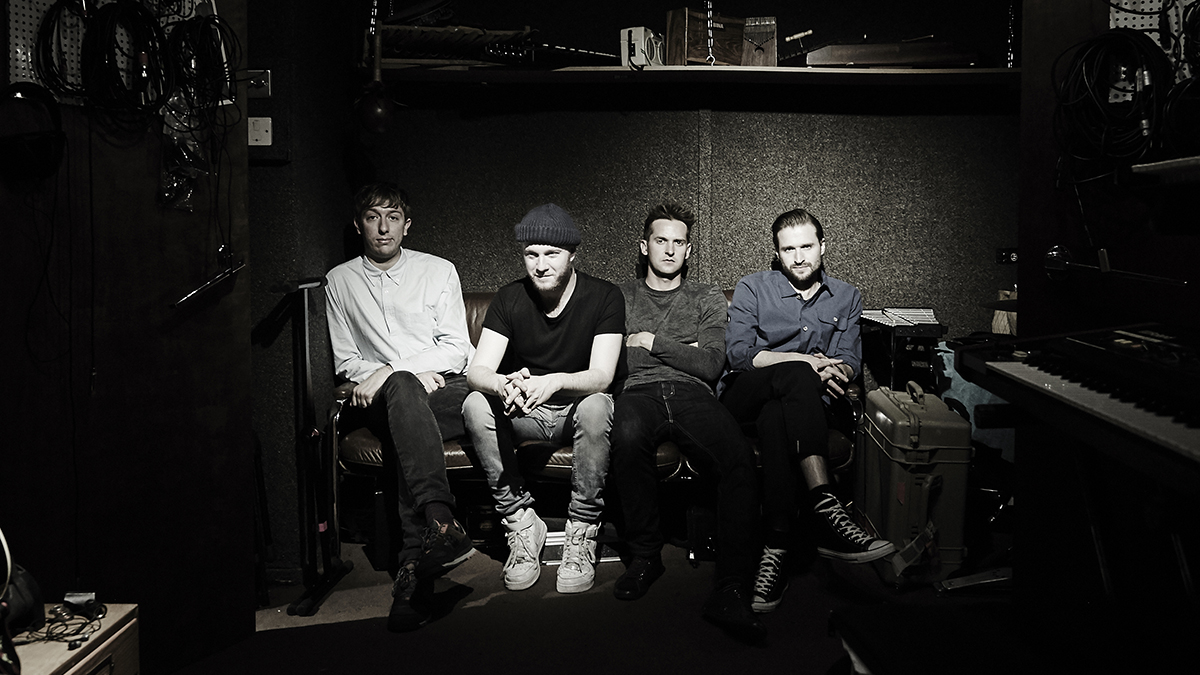
Want all the hottest music and gear news, reviews, deals, features and more, direct to your inbox? Sign up here.
You are now subscribed
Your newsletter sign-up was successful
Hailing from the rural hills of Kendal, Cumbria, Wild Beasts' debut album Limbo, Panto (2006) made an immediate critical impact, with much of the attention focused on lead singer Hayden Thorpe's astonishing falsetto vocal.
While under the guidance of Domino, the band gained access to their inspiring stockroom of artists. The syncopated electronic tones of Kieran Hebden's Four Tet provided a particularly persuasive argument for moving beyond the confines of a traditional four-piece rock band.
After much experimentation, Wild Beasts' transgression from rock to dreampop to electro pop has been seamless. New album, Boy King, deftly combines all three elements, presenting their most persuasive and textured album to date, driven by Thorpe's melancholy lyrical machinations and his bandmates' eclectic ambition to tread new ground.
How did Wild Beasts form and what was the ideology; it was just you and Hayden right?
"When we started, we were very stripped back. We'd play guitars without effects or pedals and we were staunch on having to learn our trade. We learned a lot on the first record when we went out to Sweden and recorded with producer Tore Johansson, who'd worked with Franz Ferdinand and The Cardigans.
"He had an amazing studio with huge American-style rooms. Up to that point, we'd been rehearsing in a basement - a basic drums, bass and guitar set-up with no effects. So going there opened our eyes up to the toys producers have in terms of effects, and maybe some outboard gear.
"Since then, we've delved more and more into the effects side of things and getting the most out of sounds. It's just been a progression really, and the electronic side of it - finding that voice - has become more and more exciting. A guitar is just a guitar, but when you write on synthesizers you can evoke a widescreen sound and quickly get a feeling for how a song is going to be."
Want all the hottest music and gear news, reviews, deals, features and more, direct to your inbox? Sign up here.
Your style has changed quite a bit over the years... Your debut album was reminiscent of Sparks. Were they an influence?
"Yeah, a lot of people say that. We'd actually never heard of Sparks, and a lot of people said we sounded like Kate Bush as well. At the time, we were still quite young and those were the songs we'd written when we were 18 or 19. When we went into the studio we were getting a hell of a lot of material off our shoulders; it was all guns blazing should I say [laughs]. We've hopefully learned how to write better songs without everyone having to be playing their instruments all the time, but Limbo, Panto was quite an intense record and we're very proud of it."
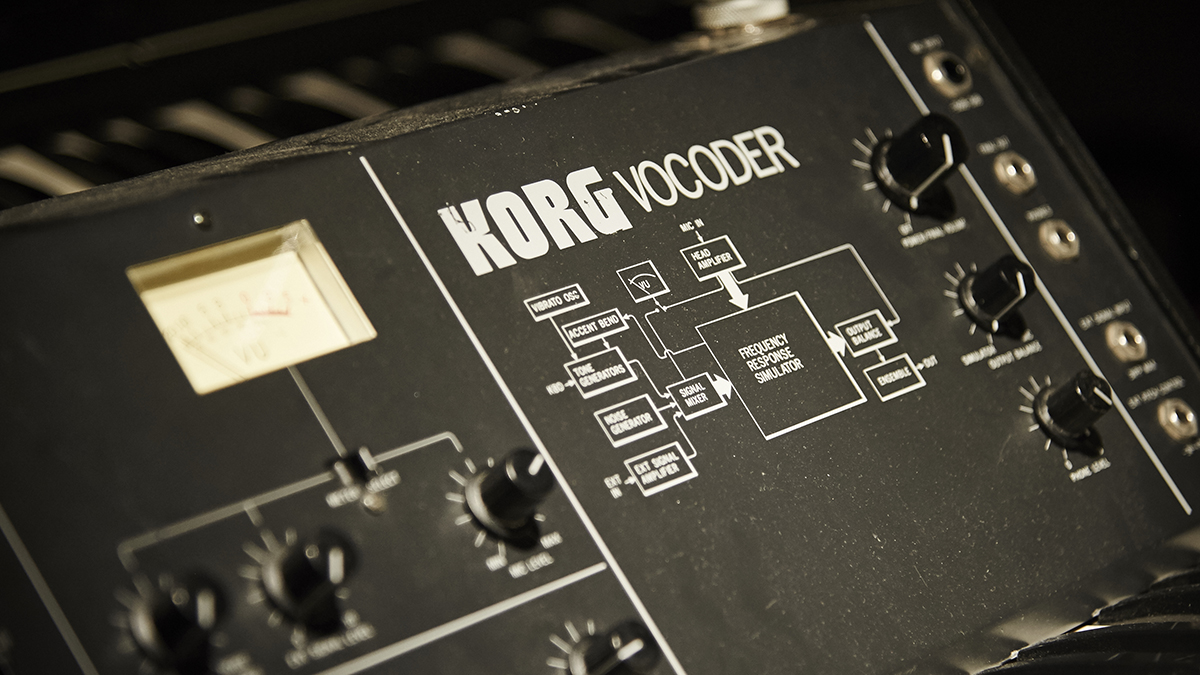
Hayden has an amazing falsetto vocal. Does having a vocalist with a distinctive attribute like that lead you down a path to some extent?
"Totally, although I think he has mellowed with age. In the early days, I think it was our take on listening to stuff like Nirvana. It was Hayden's way of being a bit brash and upfront; making people listen I guess. It's amazing when you listen to what he was doing with his voice - some of the technical things going on, because falsetto's not an easy pitch to sing.
"The Club Of Fathomless Love from the first record is so full-on vocally; a lot of ups and downs, highs and lows. I can't speak for Hayden, but I think he's now more able to use his voice as a tool - and it's an amazing tool to have."
When we signed to Domino, they let us go and raid their stockroom and we ended up playing a lot of it in the tour bus. I think that had a massive effect on the electronic side.
Wild Beasts have an underlying melancholy, but with the new album, Boy King, there seems to be a bit more thrust…
"In the past, we have definitely made more sensitive music. The album Smother was quite slow and bruised, but on Boy King we definitely tried to lose our fear and be a little more bold. For a year, we were locked away working on this material in our own studio in London and then we went to Dallas and recorded with John Congleton. He has a really cool studio, quite low key - nothing too posh, but the recording equipment is incredible. As soon as we started playing, he was really pushing the gain up and I remember thinking this is a step up.
"We credit John for bringing us out of our shell. I think Americans have that about them - they have a mega-confidence. As four British guys, we turned up with all these fears, but when we talked about them with John, he was like, 'fuck it, just nail it' - he definitely brought a confidence to us."
At what point did the shift to using electronic sounds and gear manifest itself and why?
"It was a very natural process really. When we signed to Domino, they let us go and raid their stockroom and we ended up playing a lot of it in the tour bus. I think that had a massive effect on the electronic side.
"There's a band called Junior Boys that we'd put on after a gig and listen to, and I think that had a massive influence on us. The chord changes and the things they were doing electronically definitely became embedded in our heads, even though we don't directly think about them when we're writing. They're still bringing out amazing stuff, like their last album Big Black Coat - I really like what they did there."
The guitars have also moved to the forefront of the production a little more…
"Yeah, that's exactly it. We were definitely fighting with that in our studio. We were playing ridiculous solos and having a lot of fun with them, but when we went into the studio we weren't massively sure whether they would feature too heavily. But John definitely wanted to bring out that bold and outrageous side of things, so we embraced it and were really happy with the guitar sound and what we did with it. It isn't just crowbarred in; it sits well."
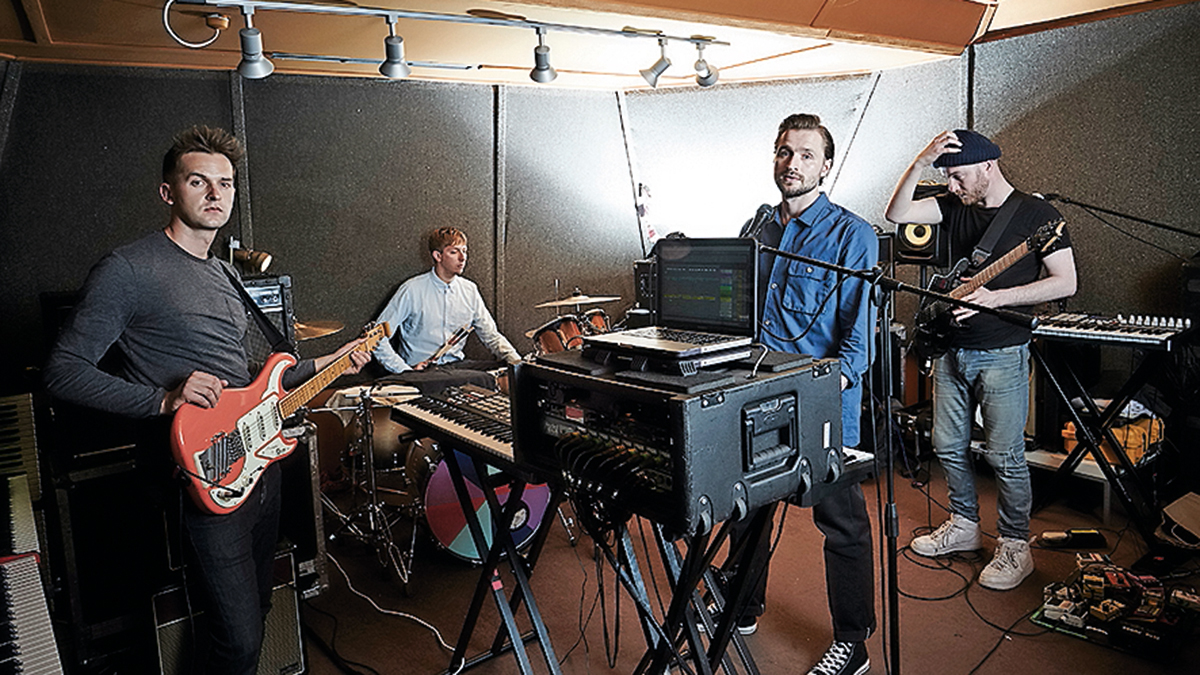
Do you write songs as a band, jamming?
"It's always different really. Sometimes an idea will stem from a guitar riff that we're messing around with and maybe Hayden or Tom [Fleming] will go away, work on it and come back with their take on things. They are the ones who will usually come up with the concept; the bare bones I guess. Hayden might bring an iPad in. I'm not too familiar with it, but he's got a Korg app that he uses a lot, so he has a lot of synth sounds he can quickly and effectively bring up to make good sounds from.
"They may not always be used in the finished recording, but that allows him to get somewhere with a song very quickly. From there, we'll record ourselves and the songs will be pretty well formed, perhaps 80% done before we go into a professional studio."
Did using electronics open new pathways in terms of songwriting or were they initially introduced to add more colour to the sound?
"It's difficult, because with a guitar or a vocal you can be sincere, but when you are searching for a feeling, you can play a keyboard and quickly create this huge, widescreen effect that's difficult to find if you're just plonking away on a piano or playing a guitar. We've been playing guitars a long time, and it's not as though they weren't exciting us because we've almost rediscovered them on this new record, but with a guitar you're always trying to surprise yourself.
"The excitement of getting involved in electronics, getting cool sounds and playing around with things for the first time is a massive part of it really. You feel like there's a lot more you can do - you can keep pushing yourself and you're not going over old ground. As a band, we instrument swap quite a lot and play all of the stuff, apart from the drums. Chris [Talbot] the drummer is probably the best pianist out of all of us [laughs]."
So how did you look for gear to help you create this new electronic sound palette?
"In terms of using the Akai MPC or the Roland SP-404, it was more about listening to other music and wondering how the hell they got a particular sound. The first time we got an MPC was probably from listening to a lot of hip-hop and going on the internet and finding out how they made a sound. Also, there's often a lot of toys that producers will have lying around that you can plug in and get cool sounds out of - then when you get home you need to buy it.
"There's a couple of pedals that I was using out in America - one was a Mothership by Pigtronix. As soon as I got back, I had to find one. We're all very interested in analogue synths. We've got a Roland Juno-6 and a Prophet '08, both of which featured heavily on the last record."
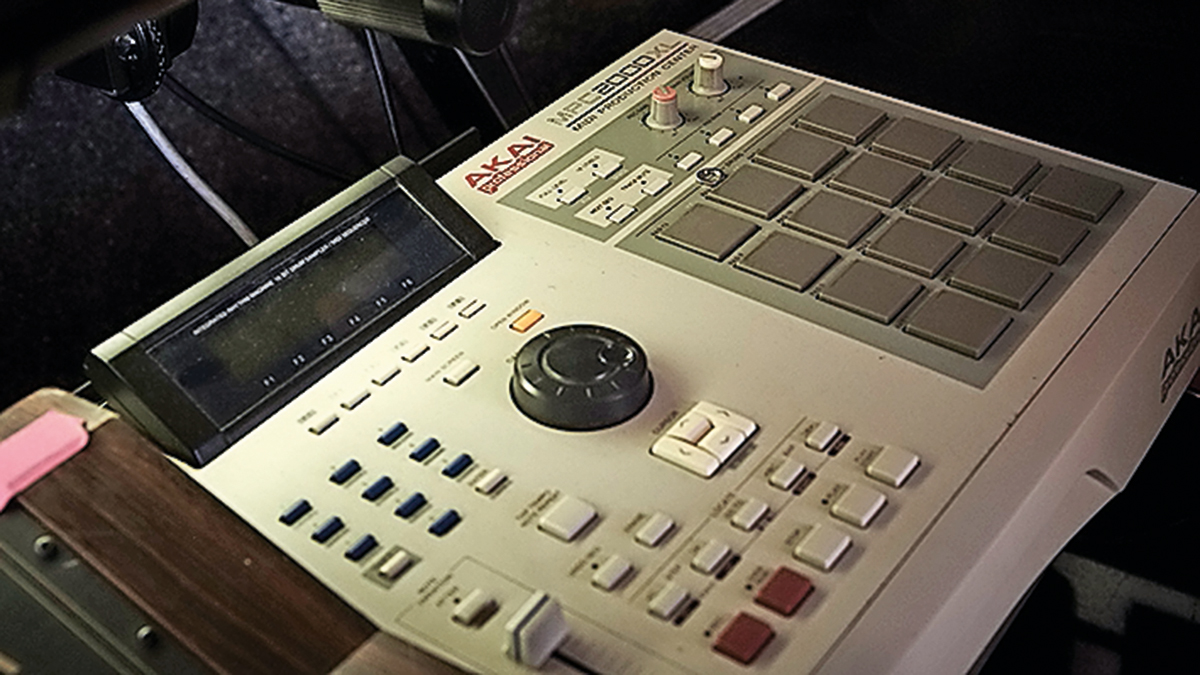
Are you also an advocate of using software?
"We do use plug-ins and I'm really interested in that side of it, but I'm also wary because they can sound very cheap. You don't always get a lot of character from the plug-ins; for some reason we find that using analogue synths always sounds more HD. But I do use Soundtoys a lot, particularly Crystallizer, and Filter Freak was used a hell of a lot - I think their plug-ins are really well built and you can quickly navigate a good sound.
"There's a track called Celestial Creatures where the song is basically about the sound. In terms of keys, we'll tend to use Elektron's Analog Keys, which is very powerful. The amazing thing about having these things at your fingertips is the breadth of sound you can get from them. When people are getting annoyed at the computer crashing, I'm just thinking, yeah, it crashes, but 40 years ago you'd need a big studio to achieve this. We're sort of spoilt really.
"The amount of stuff you can do on a computer, or even a laptop, is mindboggling. I find that sometimes you don't know where to start, there's almost too much to go on in that respect. That's why going back to basics and playing guitar is also a good place to start."
We love the album's retro-futuristic cover art. Is that something you all had an input in?
"We definitely had pointers in terms of what we were going for. With artwork and videos and things like that, we always commission artists that we like. A design house called I Love Dust came up with the record sleeve and just nailed it. They showed us some stuff they'd worked on before and it was all so bold and larger than life. I think the record needed that heavy metal-style sleeve."
Your music always sounds stripped back, as if you're discarding anything that's unnecessary…
"I'm glad you pointed that out as it's something we've got better at as we've gone on. I think we've just learned how to make songs and get the best out of them. The new record does sound stripped back in places, but when something's in, like a guitar, it's a force. John mixed and produced the record in just over a month.
"I remember during mixing how he'd play it back and there would be things missing - he'd cut out my guitar part or drop a synth part or the whole of a verse. At first I thought, oh, where's that great lick I did, but he definitely comes at it from the point of, if it's unnecessary, just get rid of it, which was brutal in some cases but I'm really happy with how boiled down it is."
Working with a producer you can fear a loss of control. Does the ego have to overcome that?
"I guess so. The four of us all have a pretty strong voice when it comes to recording, and to be honest our music doesn't need a lot of producing in terms of the song structures. We have very strong, fixed ideas when we go into the studio and are mindful about producers, particularly sound wise. But most producers who have been doing it for a long time know how to get the best out of a song and you've got to take their advice on board.
"I remember thinking the first record was going to be a huge mega-hit; it got amazing reviews and did well in that respect, but we didn't sell so many records. For our second album, we used an amazing producer in Leeds called Richard Formby who, no offence to him, was recording local bands at the time, but it did a lot better than the first one. I think it's important to have a comfortable relationship with a producer - the speed at which they get the most out of everything is testament to how long they've been learning their craft."
How are your roles divided up in terms of arranging and producing the tracks?
"Usually, I'm recording things in and arranging things, and asking what everyone thinks. I'm sort of the engineer I guess. I'm also inputting the guitar side of it, so there's a lot juggling going on. But with Boy King I had to remind myself we were going to go to a producer and there was also going to be an engineer, even though the demo sounded great. We could have released the demos based on the quality of the recordings, but once we started working with John we realised he was a completely different animal.
"When we heard the drums through his analogue Neve desk, we realised just how much you can push the gains, and it was really exciting to sponge off John and learn as much as possible."
What other production tips did you pick up?
"More than anything, we'd start a song, play it in a room and record it down, and then we were sort of expecting to listen to it back but John would literally go on to the next song - he wouldn't let us listen back to things. So we were constantly chasing these songs and thinking, shit, what did we do? We'd have maybe six songs going on at the same time, and the only time we'd ever hear them back was when the vocals were being cut down. That was an interesting take because it never got boring and we didn't overanalyse things.
"We can definitely try and adopt that approach in the future, because when you play a guitar take 50 times you can sort of drive yourself mad. Also, when we were mixing the record it still sounded really fresh."
Who did you use for mastering?
"We use a person called Guy Davie from Electric Mastering in London. He's always on our records because our manager swears by him, and now we've got a really great relationship with Guy. We've recently been sending him some exclusive material, which I can't really talk about, but we've been basically writing songs in the studio and sending them out to Guy. It's amazing how skilled these guys are, it makes a huge difference, but with Boy King, John was pretty adamant that we used a New York-based mastering engineer that he had in mind."
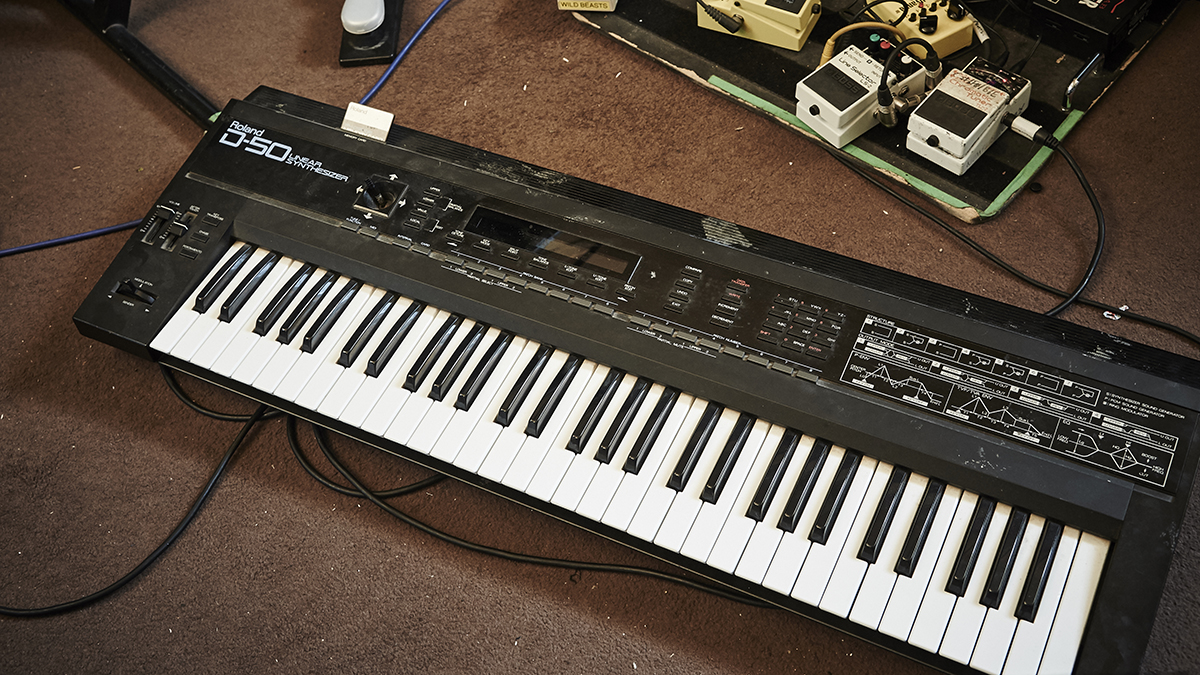
Have you found buying electronic gear to be addictive?
"It's a scary world to be honest. I'm a guitarist so I could spend a fortune on guitars, but now there's also the recording side of it. I could be looking at mics a producer might use on eBay, but it's getting dangerous - I do have to stop myself from blowing all my money. But I'll probably get a nice Universal Audio compressor next, just so we can get decent vocal takes in the studio.
"We don't have a lot of outboard, but the guy who mixed three of our records lent us his compressor and you can instantly tell the difference. Because we've been very lucky in being able to have worked in a lot of good studios, the list is ever-growing."
Has it been a challenge to bring those electronic components into your live sets?
"Well, we use Ableton on stage, which is a new thing from the last record. We basically sample all the keys individually and put them into Ableton - that way we get a pretty decent representation of the record and we're able to play the parts live using MIDI keyboards.
"Maybe they don't feel quite as good, but the sound is bang on because we've literally sampled every key. We play to a click track, which is often frustrating because you want to be this rock artist and not have to rely on gear, but Ableton's an amazing tool and I think the shows have got a lot better because the songs are more consistent.
"We've still got guitar, bass and acoustic drums, so it all still sounds completely live and not coming off a computer. We use as little backing track as possible, but when you see us live there's a lot of juggling going on."
Boy King is out now via Domino. For information, news and live dates head to the Wild Beasts website.


Future Music is the number one magazine for today's producers. Packed with technique and technology we'll help you make great new music. All-access artist interviews, in-depth gear reviews, essential production tutorials and much more. Every marvellous monthly edition features reliable reviews of the latest and greatest hardware and software technology and techniques, unparalleled advice, in-depth interviews, sensational free samples and so much more to improve the experience and outcome of your music-making.
